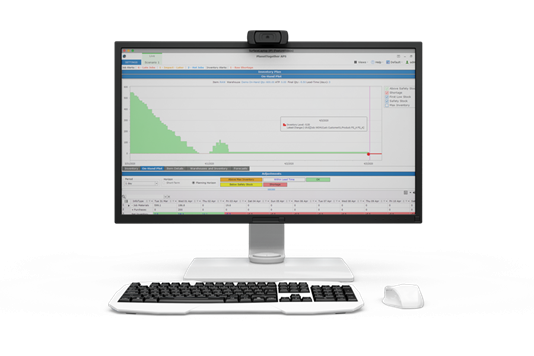In pharmaceutical manufacturing, efficiency is key. As a Production Planner, you understand the complexities involved in ensuring smooth operations while meeting strict regulatory requirements and fulfilling market demand.
In this blog, we look into the concept of Heijunka scheduling and how it can revolutionize production planning in pharmaceutical manufacturing facilities. Moreover, we'll explore the integration of Heijunka scheduling with advanced planning and enterprise resource planning (ERP) systems like PlanetTogether, SAP, Oracle, Microsoft, Kinaxis, Aveva, and others, to maximize its effectiveness.

Understanding Heijunka Scheduling
Heijunka, a Japanese term meaning "leveling" or "smoothing," is a lean manufacturing technique aimed at achieving a consistent and balanced production flow. Traditional batch manufacturing often leads to fluctuations in production, causing inefficiencies such as overproduction, excess inventory, and uneven workloads. Heijunka scheduling seeks to address these issues by leveling production across different product lines or batches, thereby reducing waste and enhancing overall efficiency.
Key Principles of Heijunka Scheduling
Leveling Production
Heijunka scheduling involves distributing production volume evenly over a specified period, ensuring a consistent workload for production teams and resources. By avoiding peaks and valleys in production, Heijunka helps optimize resource utilization and minimizes the risk of bottlenecks.
Just-in-Time (JIT) Manufacturing
Heijunka complements the JIT principle by aligning production with customer demand. Rather than producing large batches in anticipation of future orders, Heijunka enables manufacturers to respond swiftly to changing demand signals, thereby reducing lead times and inventory holding costs.
Flexibility and Adaptability
Heijunka scheduling emphasizes flexibility in production planning, allowing manufacturers to adjust schedules quickly in response to unforeseen events, such as machine breakdowns or supply chain disruptions. This agility is crucial in the dynamic pharmaceutical industry, where market demands and regulatory requirements can change rapidly.
Integration with Advanced Planning Systems
To fully harness the benefits of Heijunka scheduling, pharmaceutical manufacturers can integrate it with advanced planning systems such as PlanetTogether, SAP, Oracle, Microsoft, Kinaxis, Aveva, and others. These systems offer robust features for production planning, inventory management, and supply chain optimization, enhancing the effectiveness of Heijunka scheduling in the following ways:
Real-Time Data Integration
Advanced planning systems enable seamless integration of real-time data from various sources, including production equipment, inventory levels, and customer orders. This ensures that Heijunka schedules are based on up-to-date information, allowing for accurate decision-making and improved responsiveness to changing conditions.
Scenario Planning and Simulation
By combining Heijunka scheduling with advanced planning systems, Production Planners can conduct scenario planning and simulation to evaluate different production scenarios and their impact on key performance indicators (KPIs) such as lead times, resource utilization, and inventory levels. This proactive approach helps identify potential bottlenecks and optimize production schedules accordingly.
Supply Chain Visibility
Integrated planning systems provide end-to-end visibility into the supply chain, allowing manufacturers to anticipate demand fluctuations, identify potential risks, and optimize inventory levels across the entire value chain. This holistic view enables Production Planners to align Heijunka schedules with supply chain dynamics, ensuring a seamless flow of materials and minimizing the risk of stockouts or excess inventory.
Implementing Heijunka Scheduling with PlanetTogether
Implementing Heijunka scheduling with PlanetTogether, the Production Planner can achieve the following outcomes:
Optimized Production Schedules: Heijunka scheduling enables the Production Planner to level production across different product lines, smoothing out fluctuations in demand and ensuring a consistent workload for production teams and resources.
Reduced Lead Times: By aligning production with customer demand and optimizing resource utilization, Heijunka scheduling reduces lead times and improves responsiveness to market changes, allowing the company to fulfill orders more quickly and efficiently.
Enhanced Compliance: Integrated with PlanetTogether, Heijunka scheduling helps ensure compliance with regulatory standards by providing visibility into production processes, quality control measures, and documentation requirements. This enables the company to maintain high-quality standards while minimizing the risk of regulatory non-compliance.
Cost Savings: By minimizing waste, reducing inventory levels, and optimizing production schedules, Heijunka scheduling with PlanetTogether helps the company achieve cost savings across the entire value chain, from raw materials procurement to finished product distribution.

Heijunka scheduling offers pharmaceutical manufacturers a powerful tool for optimizing production schedules, reducing waste, and enhancing overall efficiency. By integrating Heijunka scheduling with advanced planning systems such as PlanetTogether, SAP, Oracle, Microsoft, Kinaxis, Aveva, and others, Production Planners can achieve greater visibility, agility, and control over their production processes, enabling them to meet market demand while maintaining high-quality standards and regulatory compliance.
As the pharmaceutical industry continues to evolve, adopting lean principles such as Heijunka scheduling will be crucial for staying competitive in a rapidly changing market landscape.






















LEAVE A COMMENT